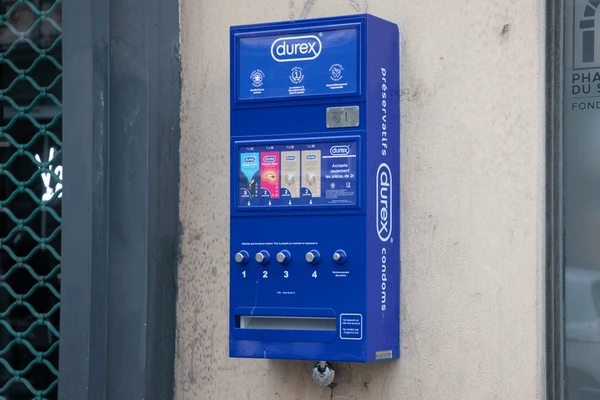
In Ghana, a new chapter in the fight against HIV is unfolding. The Ghana AIDS Commission (GAC) has announced plans to install condom vending machines across the country, a move that signals both innovation and determination in addressing one of the nation’s most pressing public health challenges. This initiative is not merely about distributing condoms; it is about dismantling stigma, reshaping attitudes, and empowering young people to make responsible choices about their health.
The announcement comes at a critical time. Health officials have expressed concern over the steady decline in condom use among young people, despite years of advocacy for safe sex and reproductive health education. At the launch of the 2025 World AIDS Day in Accra, the Director-General of the Commission, Dr. Khamacelle Prosper Akanbong, explained the rationale behind the project.
The vending machines will be strategically placed in youth-friendly and high-traffic locations such as sports stadiums, lorry stations, bars, and nightclubs. These are spaces where young people gather, socialize, and often make decisions about relationships and intimacy.
By situating the machines in such environments, the Commission is meeting young people where they are, rather than expecting them to navigate the intimidating atmosphere of a pharmacy counter. The machines will also serve a dual purpose: dispensing condoms while delivering short educational messages about HIV prevention and safe sex practices.
As Dr. Akanbong noted, “This time, we need innovative ones that are durable and interactive — as you pick your condoms, you receive messages about prevention options like pre-exposure prophylaxis (PrEP).” This integration of technology and education transforms the machines into more than vending points; they become tools of awareness and empowerment.
The idea is not entirely new. Years ago, similar machines were introduced but later discontinued due to technical failures. The Commission’s renewed effort reflects lessons learned from the past and a commitment to ensuring that this time, the machines are durable, reliable, and equipped with modern features. The proposal is currently before the National Security Secretariat for review and clearance, a necessary step before deployment begins. This careful process highlights the seriousness with which the initiative is being pursued, ensuring that it aligns with national security and public health priorities.
The urgency of the project is underscored by recent data. In 2024 alone, Ghana recorded 15,290 new HIV infections, with young people accounting for most of the cases. The country currently has over 334,000 people living with HIV, yet only 60 percent are aware of their status. These figures paint a sobering picture of the epidemic’s persistence and the gaps in prevention and awareness. Limited access, embarrassment, and social stigma continue to discourage many from purchasing or carrying condoms, perpetuating risky
“ People still face stigma when they go to pharmacies to buy condoms, you walk in and ask for a condom, and everyone looks at you. That alone discourages many young people. But if we make condoms easily accessible through vending machines, people can buy them discreetly without judgment ”
Dr. Khamacelle Prosper Akanbong
behaviors that fuel the spread of HIV. The vending machine initiative directly addresses these barriers, offering a discreet, judgment-free solution that could significantly alter the trajectory of the epidemic. This effort is part of a broader review of the National Condom and Lubricant Use Strategy, which seeks to adopt youth-centered approaches to increasing condom adoption.
By focusing on young people, the Commission acknowledges that they are both the most vulnerable group and the most capable of driving change. The initiative aligns with this year’s World AIDS Day theme: “Overcoming Disruption, Transforming the AIDS Response.” It is a theme that resonates deeply in Ghana, where disruption has come in the form of stigma, broken machines, and declining condom use, and where transformation is now being pursued through innovation and courage.
Beyond the statistics and strategies, the vending machine rollout represents a cultural shift. It challenges the notion that buying condoms should be a source of shame and instead normalizes safe sex as a responsible, everyday choice. It promotes privacy, allowing individuals to protect themselves without fear of judgment. It empowers young people to take control of their health, armed not only with condoms but also with knowledge about prevention options like PrEP. In doing so, it redefines public health as not just a matter of policy but of personal empowerment.
The Ghana AIDS Commission’s initiative is bold, timely, and necessary. It acknowledges the realities of stigma and embarrassment while offering practical solutions that meet people where they are. It leverages technology to combine access with education, ensuring that every transaction is also an opportunity for learning. And it situates the fight against HIV within a broader cultural transformation, one that seeks to normalize safe sex and dismantle the barriers that have long hindered progress.
As Ghana prepares to roll out these machines, the world will be watching. If successful, the initiative could serve as a model for other countries grappling with similar challenges. More importantly, it could mark a turning point in Ghana’s own battle against HIV, reducing infections, empowering young people, and reshaping public attitudes toward safe sex.
In the words of Dr. Akanbong, “If we make condoms easily accessible through vending machines, people can buy them discreetly without judgment.” That vision — of access without stigma, of privacy without shame, of empowerment without fear — is one worth pursuing, and it may well define the next chapter in Ghana’s AIDS response.
Source: Ghana AIDS Commission to roll out condom vending machines to curb HIV and end stigma


